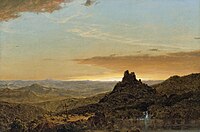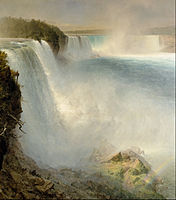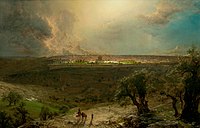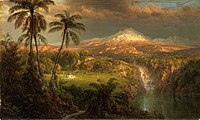Frederic Edwin Church
Frederic Edwin Church | |
|---|---|
 c. 1868 photograph by Napoleon Sarony | |
| Born | May 4, 1826 Hartford, Connecticut, U.S. |
| Died | April 7, 1900 (aged 73) New York City, U.S. |
| Known for | Landscape painting |
| Notable work | Niagara, The Heart of the Andes |
| Movement | Hudson River School |
Frederic Edwin Church (May 4, 1826 – April 7, 1900) was an American landscape painter born in Hartford, Connecticut. He was a central figure in the Hudson River School of American landscape painters, best known for painting large landscapes, often depicting mountains, waterfalls, and sunsets. Church's paintings put an emphasis on realistic detail, dramatic light, and panoramic views. He debuted some of his major works in single-painting exhibitions to a paying and often enthralled audience in New York City. In his prime, he was one of the most famous painters in the United States.
Biography
Beginnings
Frederic Edwin Church was a direct descendant of Richard Church, a Puritan pioneer from England who accompanied
In 1848, he was elected the youngest Associate of the National Academy of Design. He was promoted to full member the following year and began to take in his own students including Walter Launt Palmer, William James Stillman and Jervis McEntee.[4]
Style and influences

Romanticism was prominent in Britain and France in the early 1800s as a counter-movement to the rationalism of the Age of Enlightenment. Artists of the Romantic period often depicted nature in idealized scenes that depicted the richness and beauty of nature, sometimes with emphasis on its grand scale. This tradition carried on in the works of Church, who idealizes an uninterrupted nature, highlighted by his excruciatingly detailed art. The emphasis on nature is encouraged by low horizontal lines and a preponderance of sky. Church usually "hid" his brushstrokes so that the painting surface was smooth and the painter's "personality" seemingly absent.
Church was the product of the second generation of the
The Prussian explorer and scientist
The English art critic John Ruskin was another important and big influence on Church. In Ruskin's Modern Painters, he emphasizes the close observation of nature: "the imperative duty of the landscape painter [is] to descend to the lowest details with undiminished attention. Every class of rock, every kind of earth, every form of cloud, must be studied with equal industry, and rendered with equal precision." This attention to detail must be combined with the artist's interpretation, impressions, and imagination to achieve great art.[8] While Church's paintings were widely praised in the 1850s and 1860s, some critics found his detailed panoramas lacking in the imaginative or poetic. In his 1879 American Painters, George W. Sheldon wrote of Church's canvases, "It is scarcely necessary to ... explain what their principal defect is, because, by this time, that defect must have been recognized by almost every intelligent American lover of art. It consists in the elaboration of details at the expense of the unity and force of sentiment.... They are faithful and beautiful, but they are not so rich as they might be in the poetry, the aroma, of art. The higher and spiritual verities of Nature are the true home of landscape art."[8]
Some of Church's paintings relate to, and influenced, the luminist landscape style as well. Luminist art tends to emphasize horizontals, use non-diffuse light, and hide brushstrokes such that the painter's presence, or "personality", is less apparent to the viewer. An exhibition book considers Church's Morning in the Tropics and Twilight in the Wilderness to highlight the style's "meticulous draftsmanship and intense colors", while Cotopaxi and The Parthenon "exemplify the style ... in their panoramic structure".[9] Nevertheless, Church is not considered a primarily luminist artist.[10]
Career



Church began his career by painting classic Hudson River School scenes of New York and New England, but by 1850, he had settled in New York. He exhibited his art at the
Church quickly earned a reputation as a traveler-artist, with early domestic painting and sketching trips to the White Mountains, western Massachusetts, the Catskills, Hartford, Conn, Niagara, Virginia, Kentucky, and Maine. He made two trips to South America in 1853 and 1857 and stayed predominantly in
As he had with Niagara before, Church debuted The Heart of the Andes in a single-painting exhibition in New York City in 1859. Thousands of people paid to see the painting, with the painting's huge floor-based frame playing the part of a window looking out on the Andes. The audience sat on benches to view the piece, sometimes using opera glasses to get close, and Church strategically arranged the room to illuminate the painting with the light from overhead skylights. The work was an instant success. Church eventually sold it for $10,000, at that time the highest price ever paid for a work by a living American artist.
Church's friendship with Isaac Israel Hayes, a prominent arctic explorer, stimulated the artist's interest in the arctic regions.[12] In 1859, Church and his good friend Rev. Louis Legrand Noble traveled to Newfoundland and Labrador. The journey was chronicled in Noble's book After Icebergs with a Painter (1861), published shortly before Church's painting "The Icebergs" went on display.[13][14]

By 1860, Church was the most renowned American artist. In his prime, Church was a commercial as well as an artistic success. Church's art was very lucrative; he was reported to be worth half a million dollars at his death in 1900.
In 1861, at the start of the Civil War, Church was inspired to paint Our Banner in the Sky by a sunset featuring red, white, and blue that he believed was a symbol that "the heavens indicated their support for the United States by reflecting the nation's colors in the setting sun".[15] A lithograph was made from it and sold to benefit the families of Union soldiers.[16]
In 1863, he was elected an Associate Fellow of the American Academy of Arts and Sciences.[17]
Family, later travels, and Olana

In 1860, Church bought a farm near Hudson, New York and married Isabel Mortimer Carnes (born 1836, of Dayton, Ohio), whom he had met during the New York exhibition of The Heart of the Andes.[18] They soon started a family, but their two-year-old son Herbert and five-month-old daughter Emma both died of diphtheria in March 1865.[19] Still grief stricken, Church, his wife, and a young artist they befriended traveled to Jamaica. Church sketched while Isabel made a collection of pressed Jamaican ferns. He and his wife started a new family with the birth of Frederic Joseph in 1866, followed by Theodore Winthrop in 1869, Louis Palmer in 1870 and Isabel Charlotte ("Downie") in 1871.[19]

In late 1867, Church began the longest period of travel of his career. That fall he and his family went to Europe, moving through London and Paris fairly quickly. From
Before departing the United States for that trip, Church purchased the 18 acres (7.3 ha) on the hilltop above his Hudson farmland, which he had long wanted for its magnificent views of the
Church had been enormously successful as an artist.[22] In his last decades, illness limited Church's ability to paint. By 1876, Church was stricken with rheumatoid arthritis, making painting difficult. He eventually painted with his left hand and continued to produce works, although at a much slower pace. He still taught painting as Cole had before him. Two students were Walter Launt Palmer, son of his close friend Erastus Dow Palmer, and Howard Russell Butler. In later life he often wintered in Mexico, where he taught Butler.[23]
Spending time at Olana and in Mexico, Church was less exposed to trends in New York City. He kept a studio there into the 1880s, but it was usually sublet to Martin Johnson Heade.[24] His wife Isabel had been ill for years, and she died on May 12, 1899, at the home of their late friend and patron, William H. Osborn, on Park Avenue in New York. Less than a year later, on April 7, 1900, at the age of 73, Church also died at the home of Osborn's widow. Frederic and Isabel were buried in the family plot at Spring Grove Cemetery, Hartford, Connecticut.[25][26]
Legacy

In the last decades of his life Church's fame dwindled, and by his death in 1900 there was little interest in his work. His paintings were seen as part of an "old-fashioned and discredited" school that was too devoted to details.
Church's legacy was rekindled; American museums began to acquire his works, and by 1979 Church's The Icebergs sold for $2.5 million, then the third-highest auction for any work of art.[32] The next year the National Gallery of Art held a major exhibition, American Light: The Luminist Movement, 1825–1875, which positioned Church as the leading American painter of his time.[27]
Church's paintings, more confident and on a grander scale than those of his contemporaries, uniquely captured the spirit of an optimistic American people who associated the landscape of the New World with manifest destiny. Art historian Barbara Novak wrote that Church was "a paradigm of the artist who becomes the public voice of a culture, summarizing its beliefs, embodying its ideas, and confirming its assumptions."[33]
Olana State Historic Site is now owned and operated by the New York State Office of Parks, Recreation and Historic Preservation, Taconic Region, and with its curatorial work, visitor services, and external relations managed by The Olana Partnership, a private, non-profit organization. In 1999, just before the centenary of Church's death, The Olana Partnership established the Frederic Church Award to honor individuals and organizations who make extraordinary contributions to American art and culture.
Gallery
-
Cotopaxi, 1855
-
Cross in the Wilderness, 1857
-
Washington, DC.
-
Morning in the Tropics, ca. 1858,The Walters Art Museum, Baltimore
-
Oosisoak, 1861
-
Rainy Season in the Tropics, 1866, Fine Arts Museums of San Francisco
-
Jerusalem from the Mount of Olives, 1870, The Nelson-Atkins Museum of Art
-
The Parthenon, 1871, The Metropolitan Museum of Art
-
Passing Shower in the Tropics, 1872, Princeton University Art Museum
-
El Khasné, Petra, 1874, Olana State Historic Site
Notes
- ^ Howat, 3
- ^ Cooper-Hewitt, National Design Museum. Retrieved September 30, 2012.
- ^ Kelly (1988), 2
- ^ a b Kelly (1989), 158–159
- ^ Avery, 17
- ^ "Master, Mentor, Master: Thomas Cole & Frederic Church". Thomas Cole National Historic Site. Retrieved September 19, 2014.
- ^ Avery, 12
- ^ S2CID 192481515.
- ^ Wilmerding, 17
- ^ Wilmerding, 120
- ^ Personal narrative of travels to the equinoctial regions of the New Continent, during the years 1799–1804. Voyage aux régions équinoxiales du nouveau continent.English. Longman, Hurst, Rees, Orme, and Brown, AMS Press.
- ^ Gerald L. Carr. Frederic Edwin Church: Catalogue Raisonne of works of art at Olana State Historic Site. (1994) p. 277
- ^ Howat 2005 p. 92 – whole section on trip -> pp. 91–96
- ^ "After icebergs with a painter". New York [etc.] D. Appleton and company. 1861.
- ^ Richardson, Heather Cox, Letters from an American, May 29, 2021
- ^ "Rally 'Round The Flag – Frederic Edwin Church and The Civil War". The Olana Partnership. 2011. Retrieved September 20, 2018.
- ^ "American Academy of Arts and Sciences". Retrieved October 20, 2023.
- ISBN 0-89468-136-2.
- ^ ISBN 1-883789-28-1.
- ^ Carr "Catalogue Raisonne' . … p. 304
- ^ [fn93 FEC to EDP October 18, 1884; Coll.AIHA][quoted in NGA catalogue, p. 147
- ^ A newspaper reported: "New York Artist Leaves Stocks Valued at $474,447.72. The largest estate that has come under the jurisdiction of the Probate Court of this district for some months has lately been admitted." Unidentified newspaper clipping quoted in Huntington, 21
- ISBN 9780870992445.
- ^ Huntington, 110
- ^ Huntington, 111; Howat, 184
- ^ McEnroe, Colin (July 12, 1995). "A Tidy Resting Place For Famed Artist". Hartford Courant.
- ^ a b Kelly (1989), 12–14
- JSTOR 3257164.
- ^ Harvey, 12
- ^ "Must this mansion be destroyed?" Life Magazine, May 13, 1966. page 64.
- ^ Morrow, Ann (August 2018). "Saving Frederic Church's Olana". HistoryNet. Archived from the original on January 7, 2022. Retrieved January 6, 2022.
- ^ Harvey, 24
- ^ Quoted in Kelly (1988), viii
Sources
- Avery, Kevin J. (1993). Church's Great Picture: The Heart of the Andes. Metropolitan Museum of Art. ISBN 978-9994925193.
- Harvey, Eleanor Jones; Church, Frederic Edwin (2002). The Voyage of the Icebergs: Frederic Church's Arctic Masterpiece. Dallas Museum of Art. ISBN 9780300095364.
- Howat, John K.; Church, Frederic Edwin (2005). Frederic Church. Yale University Press. ISBN 978-0300109887.
- Huntington, David C. (1966). The Landscapes of Frederic Edwin Church: Vision of an American Era. George Braziller. LCCN 66-16675.
- Kelly, Franklin (1985). Frederic Edwin Church and the North American Landscape, 1845–1860 (Thesis). ProQuest 303390102.
- Kelly, Franklin (1988). Frederic Edwin Church and the National Landscape. Smithsonian Institution Press. ISBN 978-0-87474-592-4.
- Kelly, Franklin (1989). Frederic Edwin Church. National Gallery of Art. ISBN 978-0874744583.
- Wilmerding, John (1980). American Light: The Luminist Movement, 1850–1875. Washington: National Gallery of Art. ISBN 9780691002804.
External links
![]() Media related to Frederic Edwin Church at Wikimedia Commons
Media related to Frederic Edwin Church at Wikimedia Commons
- Frederic Edwin Church works at National Gallery of Art
- Timeline of Art History Metropolitan Museum of Art
- The Olana Partnership
- American Paradise: The World of the Hudson River School, an exhibition catalog from The Metropolitan Museum of Art (fully available online as PDF), which contains material on Church (see index)
- Art and the empire city: New York, 1825–1861, an exhibition catalog from The Metropolitan Museum of Art (full PDF), which contains material on Church
- Lyrics to the song "Olana" by Marc Cohn, about Church and the Olana estate, from Church's perspective. Archived July 25, 2021, at the Wayback Machine
- Art Renewal.org
- Frederic Edwin Church Gallery at MuseumSyndicate Archived August 28, 2021, at the Wayback Machine















